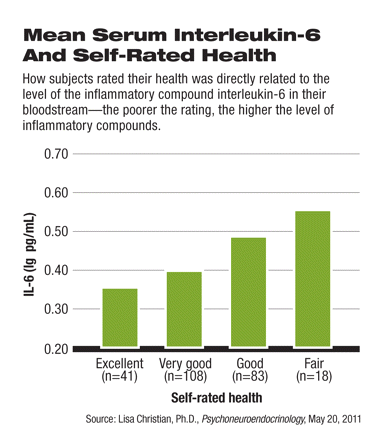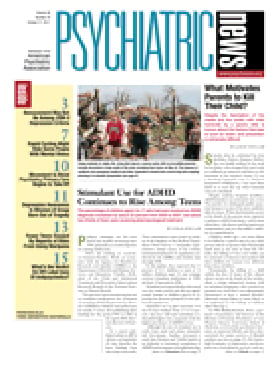When subjects reported their health as less than excellent, but not necessarily bad, they also demonstrated an inflammatory response beyond one that could be ascribed to ongoing objective illness.
This finding was reported May 20 in Psychoneuroendocrinology.
Lisa Christian, Ph.D., an assistant professor of psychiatry at Ohio State University, led the study. The senior investigator was Janice Kiecolt-Glaser, Ph.D., a professor of psychiatry at Ohio State.
Christian and her colleagues measured the level of several inflammatory compounds in the bloodstream of 250 subjects who had an average age of 64, but whose ages ranged from 50 to 78. The researchers also had the subjects evaluate their medical health with the 36-item RAND Health Survey, a non-disease-specific measure of functioning and well-being. Ninety-three percent rated their health as good, very good, or even excellent; 7 percent rated it as fair. None rated it as poor.
The researchers then used a series of linear regression analyses to see whether there was a link between the level of inflammatory compounds in the bloodstream of these adults and their self-rated health, while taking medical illnesses such as depression, diabetes, high blood pressure, heart disease, or thyroid problems, as well other possible confounders, such as sleep quality, physical activity, or medication use, into consideration.
The researchers did find such a link between the two factors. The more poorly the subjects rated their health, the higher the level of inflammatory compounds in their bloodstream.
The meaning of these findings, however, is open to interpretation.
For example, as Christian and her colleagues concluded in their paper, "The association between self-rated health and inflammation was not accounted for by objective health diagnoses, medication use, or health behaviors. The association was not due to effects of depressive symptoms and was not accounted for by perceived changes in recent health. Thus, self-rated health provides unique information regarding inflammatory status above and beyond traditional objective health indicators."
But exactly what information beyond traditional objective health indicators could self-rated health offer? William Malarkey, M.D., a professor of internal medicine at Ohio State University and a member of the research team, ventured a possible explanation during an interview with Psychiatric News: Some of the subjects were probably "worriers," and "they paid a physiological price for their worrying with an increased level of inflammatory compounds." The inflammatory compounds then made them feel unwell by provoking fatigue, lack of appetite, and other illness symptoms. And if people experience an elevation of inflammatory compounds long enough, Malarkey explained, the elevation can contribute, at least in some individuals, to the development of illnesses such as arthritis, cancer, cardiovascular disease, diabetes, or inflammatory bowel disease.
The study was funded by the National Institutes of Health.


